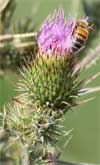Diesel fumes baffle bees says study

Honeybees rely heavily on their sense of smell to locate flowers from which they harvest life-giving nectar - transferring pollen grains from one bloom to another in the process.
The new research shows that diesel exhaust fumes from cars, trucks, tractors or power generators can chemically alter the smell of flowers and render them undetectable to bees.
This, in turn, threatens the insects' crucial role as a key pollinators of human food crops.
"Somewhere in the region of 70% of world crops require pollination services from bees and about 35% of global food production is reliant on pollination," study co-author Tracey Newman of the University of Southampton told a press conference ahead of the report's release in the journal Nature Scientific Reports.
Bees hugely valuable to humanity
Pollination services have an estimated economic value of €153bn a year.
For the study, Newman and a team created a synthetic odour blend mimicking the complex chemical mix that make up the smell of oilseed rape flowers.
The synthetic blend of eight chemicals was released into a sealed glass vessel with clean air and another that contained diesel exhaust at levels similar to rush-hour, roadside fumes.
The fumes contained high concentrations of NOx gases: nitric oxide and nitrogen dioxide, as well as carbon monoxide.
Within one minute, the chemicals alpha-farnesene and alpha-terpinene, which comprised 72.5% and 0.8% of the blend respectively, were "rendered undetectable" in the diesel-polluted air.
The other chemicals were also considerably reduced in volume while there was no change for the blend in the clean-air vial.
Bees notice the difference
Next, the team tested whether bees would notice the difference. They trained the insects by exposing them to the eight-chemical synthetic odour blend and feeding them a sugar solution at the same time to build an association of reward - as the smell of flowers holds the promise of nectar.
Over time, the trained bees would start sticking out their tongue-like proboscis in anticipation whenever they recognised the odour.
The scientists then removed chemical elements from the synthetic odour to create a depleted mix like the one left over after diesel exposure.
"When we removed alpha-terpinene, the insects' ability to recognise the odour dropped to less than 30%," said Newman. She said this showed that the bees no longer recognised the smell because they did not extend the proboscis.
Dramatic recognition drop
When alpha-farnesene was taken out too, the ability dropped even further.
"This isn't just about a bee getting confused because there is a new smell around. This is actually that the chemistry of the odour itself is being chemically altered," she explained.
"If the foraging bees are unable to find nectar, the entire hive will lack of food -- as will the plants that depend on pollination to reproduce," she said.
"And without efficient, effective pollination, there are going to be serious consequences for human health," said Newman.
Bees account for some 80% of pollination by insects, but their numbers have slumped in Europe and the United States in the past 15 years because of a worrying phenomenon dubbed colony collapse disorder (CCD).
The mysterious plague, often characterised by a rapid loss of adult worker bees, has been blamed on everything from agricultural pesticide use to a loss of wild bee habitat, a virus or fungus, mites or a combination of these. It may now also include diesel fumes.
The disorder has killed off about 30% of bees annually since 2007.
Source: AFP via I-Net Bridge
Source: I-Net Bridge

For more than two decades, I-Net Bridge has been one of South Africa’s preferred electronic providers of innovative solutions, data of the highest calibre, reliable platforms and excellent supporting systems. Our products include workstations, web applications and data feeds packaged with in-depth news and powerful analytical tools empowering clients to make meaningful decisions.
We pride ourselves on our wide variety of in-house skills, encompassing multiple platforms and applications. These skills enable us to not only function as a first class facility, but also design, implement and support all our client needs at a level that confirms I-Net Bridge a leader in its field.
Go to: http://www.inet.co.za










